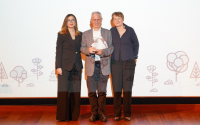25 May 2006The Sydney Morning HeraldJulia Baird
"The debate is over. We know the science. We see the threat posed by changes in our climate. And we know the time for action is now." That was Arnold Schwarzenegger. Last year. You know the climate change debate has changed radically when it is being championed by the man whose steroid-riddled body portrayed post-apocalyptic robots in the Terminator films.
And now, the man who refused to sign the Kyoto Protocol, John Howard, has suddenly emerged as an advocate of drastic action to stop the overheating of the Earth.
The nuclear energy debate this week has been fascinating and - no matter what your thoughts on its use here - a relief of sorts. At least we're all agreeing on one thing - global warming and climate change are serious, and potentially catastrophic, problems. Serious scientific research is no longer being misrepresented as a left-wing beat-up propelled by mad greenies and anxious scientists. At last, the vocal deniers are shrinking like the wicked witch of the west drenched by a bucket of melting icecaps.
We now know that 19 of the world's 20 hottest years have occurred since 1980 - the three hottest have all occurred since 1998. We know that icecaps are melting, coral reefs are being bleached, floods are more frequent and glaciers are disappearing, and that we can expect more powerful hurricanes, drier land, more frequent fires and the extinction of a growing number of species.
This week, a report by the Australian National University, commissioned by the Federal Government, found that by 2100 temperatures could increase by almost 6 degrees - much more than originally estimated. We need serious, probably painful and expensive solutions. In light of this, many environmentalists have softened their opposition to nuclear energy and urged further investigation or broader use. In May 2004 the British environmentalist - and originator of the Gaia hypothesis - James Lovelock shocked his colleagues by
arguing passionately for a significant expansion of nuclear energy because of the rapidity and urgency of climate change.
Lovelock has since been joined by several prominent environmental scientists in the US and this month The New York Times leant its weight to his stance, in an editorial headed "The Greening of Nuclear Energy". It argued that the nuclear energy debate should be reopened because uranium is abundant and cheap, and "nuclear energy can replace fossil-fuel power plants for generating electricity, reducing the carbon dioxide emissions that contribute heavily to global warming. That could be important in large developing economies like China's and India's, which would otherwise rely heavily on burning large quantities of dirty coal and oil."
But what applies to the oil-guzzling US does not necessarily apply here. Exporting uranium to rapidly expanding markets such as India and China makes sense: they have soaring population numbers, little coal, exponential economic growth and rocketing demand for electricity. But we have plenty of gas, coal and coal-fired power stations, and a small population. As Peter Costello pointed out, the commercial imperative is slim.
And while the debate is important, we don't just need to plonk a few billion-dollar plants on the coast or in the desert, particularly when they will take decades to have any impact. The concerns about bombs, disposal, waste storage and security are still valid - and the memory of Three Mile Island and Chernobyl vivid.
What we need to do is get serious about our entire environmental strategy, radically rethink our approach to energy and correct the years of denial and neglect by our governments. We need to implement all those other suggestions green groups have been promoting for decades: renewable energy sources, solar energy, that unsigned protocol, carbon taxes and credits, energy efficiency and investing in wind, solar, geothermal and biomass energy like ethanol.
With wonderful timing, this week the palaeontologist Tim Flannery received two awards at the NSW Premier's Literary Awards - the Gleebooks Prize and the Book of the Year. His book The Weather Makers: The History and Future Impact of Climate Change has been
on bestseller lists not just in Australia but also around the world.
When Flannery was in Canada recently, he described environmental activism as a moral issue. He told The Globe and Mail: "I've got two kids. What would their generation say if we sacrificed climate stability and the polar regions and everything else, just so we could drive big cars and continue wasting electricity? I mean, what sort of morality is that? Those that say climate change doesn't exist, or it doesn't matter or it's too expensive to do anything about, you have to question what their moral framework is - where does it lie?"
Flannery concludes there is plenty we can do as individuals - including installing solar power, seeking out green energy suppliers, using low-power appliances and investigating fuel consumption before buying cars. There's no reason to wait.






